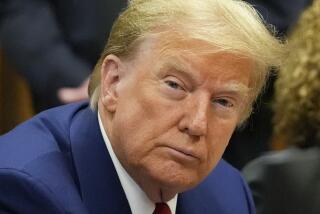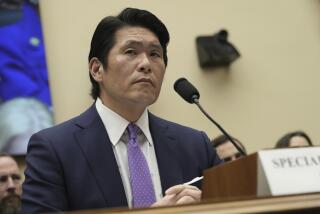White House Forwards More Donor Records
WASHINGTON â The White House belatedly produced hundreds of pages of new documents on Monday that detail private discussions between President Clinton and his senior staff on the campaign fund-raising controversy, as well as other insider glimpses of the Clinton presidency.
The production of the papers, months after they were subpoenaed by House and Senate committees, angered congressional investigators who have long complained about the White Houseâs sluggish compliance to their requests.
The notes, with most portions blacked out by presidential aides, were delivered by White House lawyers to Senate, House and Justice Department investigators, all of which are conducting inquiries into fund-raising improprieties during the 1996 presidential election.
At an evening briefing, the White House downplayed the significance of the records, saying the sketchy notes by staffer Janis Kearney in 1995 and 1996 do not contain any substantive information. Kearney, a White House records manager, was âpart of the woodworkâ during staff meetings, where she took daily notations for archival purposes, officials said.
âThe information we provided to the congressional committees contains nothing new, has generally already been reported and contains little of substantive value,â said White House special counsel Lanny J. Davis.
In excerpts released by the White House, former Chief of Staff Leon E. Panetta made comments referring to the questionable backgrounds of some of those contributing to the Democratic cause.
At one meeting, Panetta asked administration lawyers to meet with the Secret Service to determine how âa convicted felon was allowed to run around in the White House.â
Davis said Panetta was referring to Jorge Cabrera, a drug smuggler who gave money to the DNC and attended a Christmas reception at the White House hosted by First Lady Hillary Rodham Clinton.
In another meeting, Panetta referred to a Democratic National Committee fund-raiser as âanother one of those events where people come through the back door.â
Kearneyâs notes also briefly detailed Clintonâs attendance at each of the White House coffees--gatherings that frequently included major contributors.
At one staff meeting, presidential aide Nancy Hernreich differentiated between âmoney coffees,â to which donors were invited, and âpolitical coffees,â at which she said Clinton tended to talk more about issues.
The notes are filled with minutiae, such as Clintonâs meeting on Feb. 7, 1996, with the 500,000th donor to the DNC--a 65-year-old woman who sent in a check for $19.95.
Congressional investigators said Monday night they had not yet had time to determine the significance of the papers, which numbered about 200 pages. But they condemned their tardy release.
âClearly, production of materials three weeks before the committee is scheduled to end is rather late,â said Paul Clark, spokesman for the Senate Governmental Affairs Committee. âThis is enormously frustrating.â
The Senate panelâs investigation terminates at yearâs end, while the House Government Reform and Oversight Committee intends to continue its inquiry well into 1998.
House committee spokesman Will Dwyer complained that release of the papers comes months after the White House had certified it turned over everything it had that complied with the House subpoena.
âThe centipede drops another shoe,â Dwyer said.
Davis said the documents were discovered late last month as officials conducted another round of searches for information subpoenaed earlier in the year by the House and Senate.
The White House has been criticized repeatedly for its belated production of key information--delays that administration officials have attributed to a small legal staff barraged by requests.
Earlier this fall, presidential aides blamed bureaucratic bungling for their belated production of videotapes showing Clinton meeting with various campaign donors--material that investigators say they explicitly asked for.
Last month, White House lawyers acknowledged withholding from investigators for more than a year documents that said Clinton wanted a White House database created with taxpayer money to include his political contributors and to be shared with the Democratic National Committee.
The new papers were only one controversy administration officials grappled with Monday.
At the Justice Department, Atty. Gen. Janet Reno, scheduled to appear before the House Government Reform and Oversight Committee today, refused to comply with a House subpoena demanding production of a memo from FBI Director Louis J. Freeh urging that she name an independent prosecutor to investigate the donations scandal.
Reno, who rejected Freehâs advice, sent a joint letter with Freeh to Rep. Dan Burton (R-Ind.) in which she argued that the House committee Burton chairs does not have a legal right to the memo.
Release of the Freeh memo, they argued, could damage the Justice Departmentâs ongoing investigation and interfere with the deliberative process. Also, it could violate rules prohibiting the disclosure of information gathered by a grand jury, Reno and Freeh said.
âPublic and judicial confidence in the criminal justice process would be undermined by congressional intrusion into an ongoing criminal investigation,â Reno and Freeh wrote.
The standoff may prompt Burton to pursue a contempt citation against Reno. But it is typically the Justice Department that enforces such citations.
âI am especially troubled that the attorney general is refusing to respond to a legitimate oversight request after we made clear that we would accept a version of the memo from which any grand jury materials were removed,â said Burton, who intends to question both Reno and Freeh about the memo today.
Times Washington Bureau Chief Doyle McManus contributed to this story.
More to Read
Get the L.A. Times Politics newsletter
Deeply reported insights into legislation, politics and policy from Sacramento, Washington and beyond. In your inbox three times per week.
You may occasionally receive promotional content from the Los Angeles Times.










